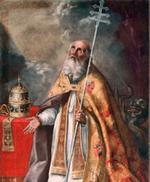Fathers of the Church
Epistle XXXIX: to Constantius, Bishop
by Gregory the Great in 590-604 | translated by James Barmby, D.d
Gregory to Constantius, Bishop of Mediolanum (Milan).
Having read the letter of your Holiness, we find that you are in a state of serious distress, principally on account of the bishops and citizens of Briscia (Brescia) who bid you send them a letter in which you are asked to swear that you have not condemned the Three Chapters. Now, if your Fraternity's predecessor Laurentius did not do this, it ought not to be required of you. But, if he did it, he was not with the universal Church, and contradicted what he had sworn to in his security. But, inasmuch as we believe him to have kept his oath, and to have continued in the unity of the Catholic Church, there is no doubt that he did not swear to any of his bishops that he had not condemned the Three Chapters. Hence your Holiness may conclude that you ought not to be forced to do what was in no wise done by your predecessor. But, lest those who have thus written to you should be offended, send them a letter declaring under interposition of anathema that you neither take away anything from the faith of the synod of Chalcedon nor received those who do, and that you condemn whomsoever it condemned, and absolve whomsoever it absolved. And thus I believe that they may be very soon satisfied
Further, as to what you write about many of them being offended because you name our brother and fellow- bishop John of the Church of Ravenna during the solemnities of mass, you should enquire into the ancient custom; and, if it has been the custom, it ought not now to be found fault with by foolish men. But, if it has not been the custom, a tiring ought not to be done at which some may possibly take offence. Yet I have been at pains to make careful enquiry whether the same John our brother and fellow-bishop names you at the altar; and they say that this is not done. And, if he does not make mention of your name, I know not what necessity obliges you to make mention of his. If indeed it can be done without any one taking offence, your doing anything of this kind is very laudable, since you shew the charity you have towards your brethren.
Further, as to what you write of your having been unwilling to transmit my letter to Queen Theodelinda on the ground that the fifth synod was named in it, if you believed that she might thereby be offended, you did right in not transmitting it. We are therefore doing now as you recommend, namely, that we should only express approval of the four synods. Yet, as to the synod which was afterwards held in Constantinople, called by many the fifth, I would have you know that it neither ordained nor held anything in opposition to the four most holy synods, seeing that nothing was done in it with respect to the faith, but only with respect to persons; and persons, too, about whom nothing is contained in the acts of the Council of Chalcedon but, after the canons had been promulged, discussion arose, and final action was ventilated concerning persons. Yet still we have done as you desired, making no mention of this synod. But we have also written to our daughter the queen what you wrote to us about the bishops. Ursicinus, who wrote something to you against our brother and fellow-bishop John, you ought by your letters addressed to him, with sweetness and reason, to restrain from his intention. Further, concerning Fortunatus, we desire your Fraternity to be careful, lest you be in any way surreptitiously influenced by bad men. For I hear that he ate at the table of the Church with your predecessor Laurentius for many years until now, that he sat among the nobles, and subscribed, and that with our brother's knowledge he served in the army. And now, after so many years, your Fraternity thinks that he should be driven from the position which he now occupies. This seems to me altogether incongruous. And so I have given you this order through him, but privately. Still, if there is anything reasonable that can be alleged against him, it ought to be submitted to our judgment. But, if it please Almighty God, we will send letters through your man to our son the lord Dynamius.
Taken from "The Early Church Fathers and Other Works" originally published by Wm. B. Eerdmans Pub. Co. in English in Edinburgh, Scotland, beginning in 1867. (LNPF II/XII, Schaff and Wace). The digital version is by The Electronic Bible Society, P.O. Box 701356, Dallas, TX 75370, 214-407-WORD.






